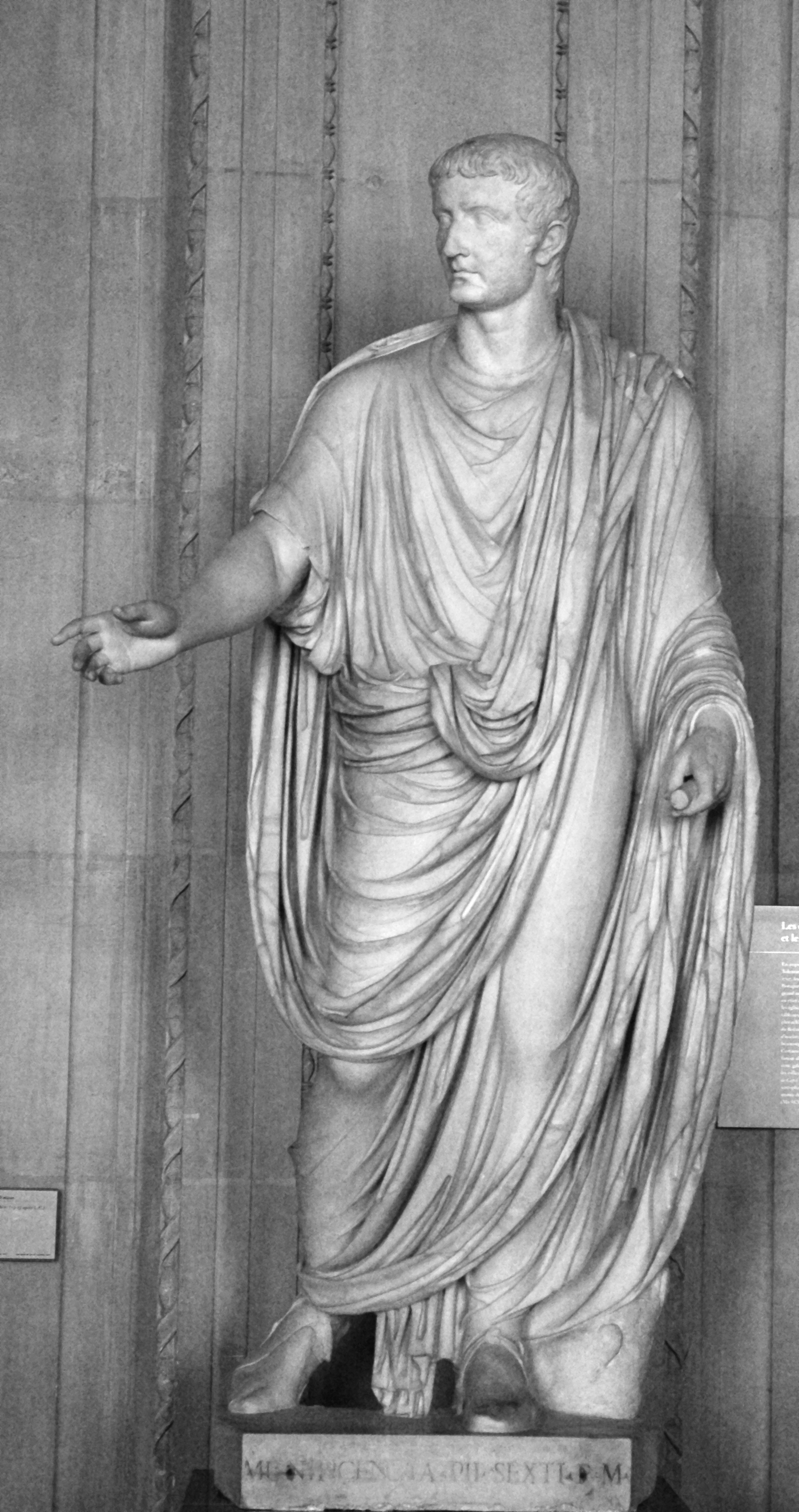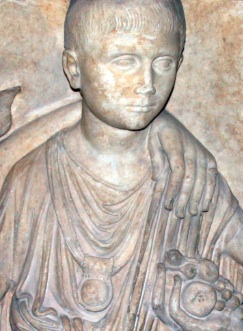|
Toga
The toga (, ), a distinctive garment of Ancient Rome, was a roughly semicircular cloth, between in length, draped over the shoulders and around the body. It was usually woven from white wool, and was worn over a tunic. In Roman historical tradition, it is said to have been the favored dress of Romulus, Rome's founder; it was also thought to have originally been worn by both sexes, and by the citizen-military. As Roman women gradually adopted the stola, the toga was recognized as formal wear for male Roman citizens. Women found guilty of adultery and women engaged in prostitution might have provided the main exceptions to this rule.. The type of toga worn reflected a citizen's rank in the civil hierarchy. Various laws and customs restricted its use to citizens, who were required to wear it for public festivals and civic duties. From its probable beginnings as a simple, practical work-garment, the toga became more voluminous, complex, and costly, increasingly unsuited to a ... [...More Info...] [...Related Items...] OR: [Wikipedia] [Google] [Baidu] |
Stola
The stola () (pl. ''stolae'') was the traditional garment of Roman women, corresponding to the toga that was worn by men. It was also called ''vestis longa'' in Latin literary sources, pointing to its length. History The ''stola'' was a staple of fashion in ancient Rome spanning from the early Roman Republic until the beginning of the 2nd century CE. The garment was first identified on statues by Margarete Bieber. The first evidence of the ''stola''/''vestis longa'' dates to the 3rd century BCE, but the form of the garment is common in the Mediterranean world and so it must be much older. In Republican times, it was simply part of Roman female dress practice. In Augustan times, when it was used much less, the ''stola'' was taken up by Imperial cultural policy and was turned – like the '' vitta'' (plaited headband) – into a dress insigne of married Roman women. It may even have been a legal privilege. By this time, it was worn only by women of the social elite. At the beginni ... [...More Info...] [...Related Items...] OR: [Wikipedia] [Google] [Baidu] |
Prostitution In Ancient Rome
Prostitution in ancient Rome was legal and licensed. Men of any social status were free to engage prostitutes of either sex without incurring moral disapproval, as long as they demonstrated self-control and moderation in the frequency and enjoyment of sex. Brothels were part of the culture of ancient Rome, as popular places of entertainment for Roman men. Most prostitutes were female slaves or freedwomen. The balance of voluntary to forced prostitution can only be guessed at. Privately held slaves were considered property under Roman law, so it was legal for an owner to employ them as prostitutes. Pimping and prostitution were, however, considered disgraceful and dishonourable activities, and their practitioners were considered “ infamous” ('' infames''); for citizens, this meant loss of reputation and many of the rights and privileges attached to citizenship. Slave-owning patrons and investors may have sought to avoid loss of privilege by appointing slaves or freedmen to ... [...More Info...] [...Related Items...] OR: [Wikipedia] [Google] [Baidu] |
Ancient Rome
In modern historiography, ancient Rome is the Roman people, Roman civilisation from the founding of Rome, founding of the Italian city of Rome in the 8th century BC to the Fall of the Western Roman Empire, collapse of the Western Roman Empire in the 5th century AD. It encompasses the Roman Kingdom (753–509 BC), the Roman Republic (50927 BC), and the Roman Empire (27 BC476 AD) until the fall of the western empire. Ancient Rome began as an Italic peoples, Italic settlement, traditionally dated to 753 BC, beside the River Tiber in the Italian peninsula. The settlement grew into the city and polity of Rome, and came to control its neighbours through a combination of treaties and military strength. It eventually controlled the Italian Peninsula, assimilating the Greece, Greek culture of southern Italy (Magna Graecia) and the Etruscans, Etruscan culture, and then became the dominant power in the Mediterranean region and parts of Europe. At its hei ... [...More Info...] [...Related Items...] OR: [Wikipedia] [Google] [Baidu] |
Kings Of Rome
The king of Rome () was the ruler of the Roman Kingdom, a legendary period of Roman history that functioned as an elective monarchy. According to legend, the first king of Rome was Romulus, who founded the city in 753 BC upon the Palatine Hill. Seven legendary kings are said to have ruled Rome until 509 BC, when the last king was overthrown. These kings ruled for an average of 35 years. The kings after Romulus were not known to be dynasts and no reference is made to the hereditary principle until after the fifth king Tarquinius Priscus. Consequently, some have assumed that the Tarquins' attempt to institute a hereditary monarchy over this conjectured earlier elective monarchy resulted in the formation of the Republic. Overview Early Rome was ruled by the king (''rex''). The king possessed absolute power over the people; no one could rule over him. The Senate was a weak oligarchy, capable of exercising only minor administrative powers, so that Rome was ruled by its king who ... [...More Info...] [...Related Items...] OR: [Wikipedia] [Google] [Baidu] |
Candidate
A candidate, or nominee, is a prospective recipient of an award or honor, or a person seeking or being considered for some kind of position. For example, one can be a candidate for membership in a group (sociology), group or election to an official, office, in which case a Preselection, candidate selection occurs. "Nomination" is part of the process of selecting a candidate for either election to an office by a political party,''Judicial and Statutory Definitions of Words and Phrases,'' Volume 1, Edition 2, West Publishing Company, 1914p. 588 or the bestowing of an honor or award. This person is called a "nominee", though "nominee" is often used interchangeably with "candidate". A presumptive nominee is a person or organization whose nomination is considered inevitable or highly likely. The phenomenon of being a candidate in a race for either a party nomination or for electoral office is called "candidacy". The term "presumptive candidate" may be used to describe someone who is p ... [...More Info...] [...Related Items...] OR: [Wikipedia] [Google] [Baidu] |
Bulla (amulet)
A ''bulla'', an amulet worn like a locket, was given to male children of Ancient Rome, children in Ancient Rome nine days after birth. Inside the medallion, an amulet was placed, which was usually a phallus – a symbol that brought good luck in antiquity. Rather similar objects are rare finds from Late Bronze Age Ireland. Roman bullae Roman ''bullae'' were enigmatic objects consisting of a neckchain and round pouch containing protective amulets (usually Fascinum, phallic symbols) worn by Roman boys before the age of manhood. ''Bullae'' were made of different substances depending on the wealth of the family they belong to: upper-classes could afford ''bullae'' made of gold or covered in gold foil, while others could only afford materials like lead, leather and cloth. Roman boys A freeborn Roman boy wore a ''bulla'' until he came of age as a Roman citizen. Before he put on his ''toga virilis'' ("toga of manhood") he placed his boyhood ''bulla'' in the care of his parental house ... [...More Info...] [...Related Items...] OR: [Wikipedia] [Google] [Baidu] |
Virgil
Publius Vergilius Maro (; 15 October 70 BC21 September 19 BC), usually called Virgil or Vergil ( ) in English, was an ancient Rome, ancient Roman poet of the Augustan literature (ancient Rome), Augustan period. He composed three of the most famous poems in Latin literature: the ''Eclogues'' (or ''Bucolics''), the ''Georgics'', and the Epic poetry, epic ''Aeneid''. A number of minor poems, collected in the ''Appendix Vergiliana'', were attributed to him in ancient times, but modern scholars generally regard these works as spurious, with the possible exception of a few short pieces. Already acclaimed in his own lifetime as a classic author, Virgil rapidly replaced Ennius and other earlier authors as a standard school text, and stood as the most popular Latin poet through late antiquity, the Middle Ages, and early modernity, exerting inestimable influence on all subsequent Western literature. Geoffrey Chaucer assigned Virgil a uniquely prominent position among all the celebrities ... [...More Info...] [...Related Items...] OR: [Wikipedia] [Google] [Baidu] |
Women In Ancient Rome
Freeborn (Ancient Rome), Freeborn women in ancient Rome were Roman citizenship, citizens (''cives''), but could not vote or hold Roman magistrate, political office. Because of their limited public role, women are named less frequently than men by Roman historiography, Roman historians. But while Roman women held no direct political power, those from wealthy or powerful families could and did exert influence through private negotiations. Exceptional women who left an undeniable mark on history include Lucretia and Claudia Quinta, whose stories took on Roman mythology, mythic significance; fierce Roman Republic, Republican-era women such as Cornelia Africana, Cornelia, mother of the Gracchi, and Fulvia, who commanded an army and issued coins bearing her image; women of the Julio-Claudian dynasty, most prominently Livia (58 BC – AD 29) and Agrippina the Younger (15–59 AD), who contributed to the formation of Roman Empire, Imperial ''mos maiorum, mores''; and the empress Helena (Emp ... [...More Info...] [...Related Items...] OR: [Wikipedia] [Google] [Baidu] |
Arval Brethren
In ancient Roman religion, the Arval Brethren (, "Brothers of the Fields") or Arval Brothers were a body of priests who offered annual sacrifices to the Lares and gods to guarantee good harvests. Inscriptions provide evidence of their oaths, rituals and sacrifices. Origin Roman legend held that the priestly college was originated by Romulus, first king of Rome, who took the place of a dead son of his nurse Acca Laurentia, and formed the priesthood with the remaining eleven sons. They were also connected originally with the Sabine priesthood of ''Sodales Titii'' who were probably originally their counterpart among the Sabines. Thus, it can be inferred that they existed before the founding of the city.Aulus Gellius VII 7, 7; Pliny XVII 2, 6. There is further proof of the high antiquity of the college in the verbal forms of the song with which, down to late times, a part of the ceremonies was accompanied, and which is still preserved. They persisted to the imperial period. Stru ... [...More Info...] [...Related Items...] OR: [Wikipedia] [Google] [Baidu] |
Tunic
A tunic is a garment for the torso, usually simple in style, reaching from the shoulders to a length somewhere between the hips and the ankles. It might have arm-sleeves, either short or full-length. Most forms have no fastenings. The name derives from the Latin '' tunica'', the basic garment worn by both men and women in Ancient Rome, which in turn was based on earlier Greek garments that covered wearers' waists. The term is likely borrowed from a Semitic word *''kittan'' with metathesis. The word khiton () is of the same origin. Ancient era Roman tunic The Roman ''tunica'' was adopted by Roman citizens in the 3rd century BCE. It was often worn by Roman citizens and by non-citizens alike. However, citizens might wear it under the toga, especially at formal occasions. The length of the garment, the presence or lack of stripes, as well as their width and ornamentation, would indicate the wearer's status in Roman society. Roman senators, for example, used the '' laticla ... [...More Info...] [...Related Items...] OR: [Wikipedia] [Google] [Baidu] |








